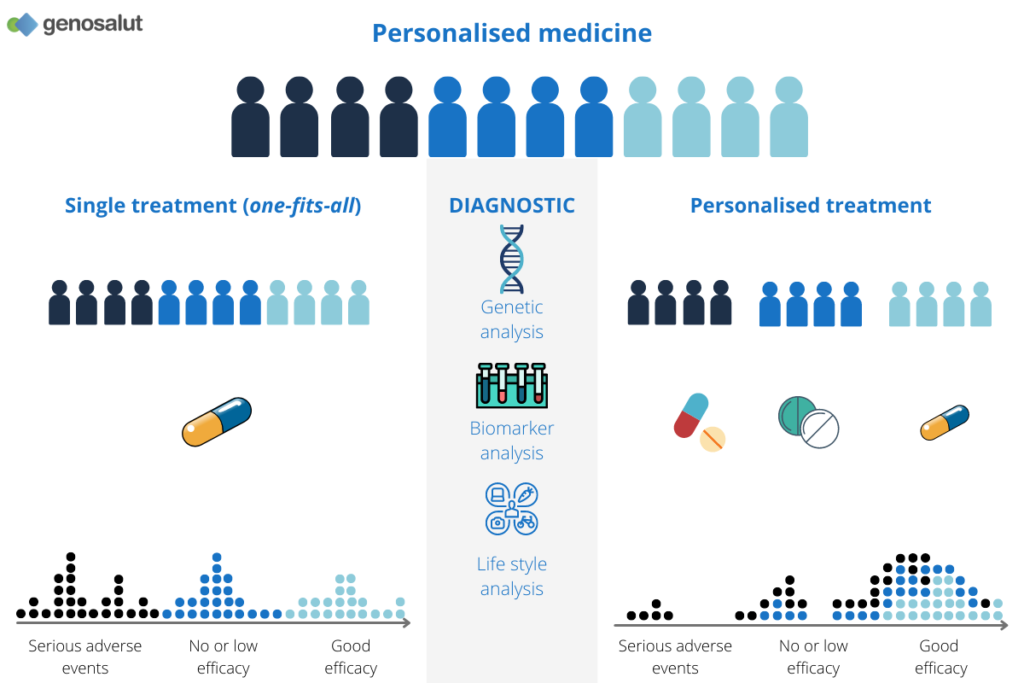What is personalised medicine?
In personalised medicine, also known as precision medicine, patients are treated according to their individual circumstances. These individual circumstances mainly comprise their genetic background, lifestyle and personal circumstances. Its success is based on individual patient characterisation and appropriate pre-testing to determine what treatment may or may not be considered for a particular patient.

The biological complexity of human beings is staggering. We are all similar, of course, but we are also all different and unique and, in many ways, so are our diseases. The advent of personalised medicine has made it possible to tailor medical treatment to the individual characteristics of each patient.
Why is personalised medicine important?
Up to now, most therapeutic concepts have been standardised. In other words, they target entire groups of patients without taking into account important individual variables such as genes, health status, physical condition, age and gender. It is therefore not surprising that drugs and therapies for the same diseases show different efficacies depending on the patient, ranging from highly effective to completely ineffective.
Today, medical research concentrates on the development of new types of individualised diagnostic procedures and innovative drugs for tailor-made therapeutic approaches. This is where a branch of genomics known as pharmacogenomics plays a crucial role.
In itself, this is a simple and logical concept: using an individual’s genetic and genomic profile to guide decisions about disease prevention, diagnosis and treatment. Indeed, the genetic knowledge we have gained in recent decades exposes a very specific molecular window into the differences between individuals. And knowing these differences has allowed us to increase our ability to predict which medical treatments are safer and more effective for each patient and which are not.
In addition to advances in the field of genomics, developments in other fields of science and technology play a crucial role in personalised medicine:
● High-resolution analytics, biotechnology research and chemistry. The efficient development of highly effective substances for individualised medicine is only possible in high-tech laboratories with powerful automated analytical systems and high-throughput screening.
● Cell and molecular biology allow elucidation of genetic and biological processes, deciphering molecular structures, signalling pathways, protein interactions and understanding the mechanisms of gene expression to successfully implement individualised and tailor-made therapy concepts of personalised medicine.
● Diagnostics. Disease-specific biomarkers play an important role, providing scientists with meaningful information on the type, molecular cause and state of the disease.

How is personalised medicine applied?
Personalised medicine opens up new possibilities for many disciplines.
For example, the application of personalised medicine in oncology makes it possible to obtain genetic and molecular information specific to both the patient and the tumour of each patient. This facilitates diagnosis and the choice of the most effective treatments, as well as allowing the prognosis to be fine-tuned.
Numerous pharmacogenomics tests are also available to assess the appropriateness of treatment with certain antipsychotics, drugs for cardiovascular diseases and HIV.
Other diseases and disorders where personalised medicine is expected to make an upcoming contribution include: Parkinson’s, Alzheimer’s, stroke, gut microbiome and personalised hearing aid.
At Genosalut we have various pharmacogenetic tests for cancer drugs, antipsychotics, vascular disorders and other diseases.
If you like our blog, subscribe to our newsletter


